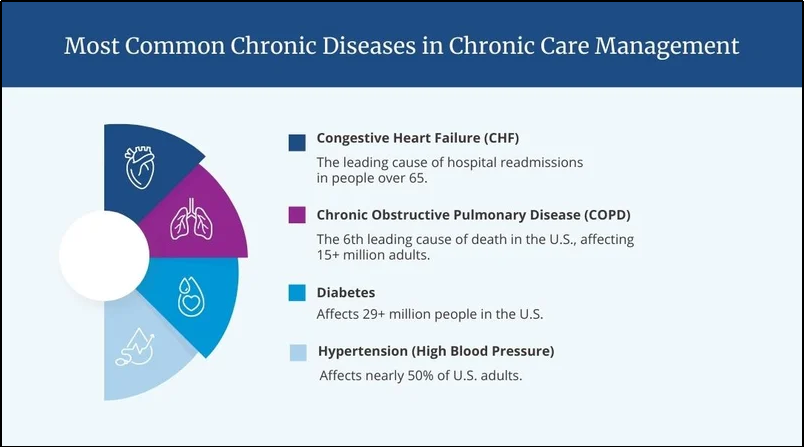Posted on : December 19, 2024

Are you wondering how healthcare providers manage the care of patients with long-term chronic illnesses? Well, managing chronic conditions can be challenging, both for patients and providers. With more people living longer and battling conditions like diabetes, heart disease, and asthma, the need for an effective chronic care management plan has never been greater.
But how can you ensure that such a plan covers all patient care? Let’s explore through the point of view of the upcoming healthcare conferences experts, notably Health 2.0 Conference 2025, how to develop a comprehensive plan that addresses every detail of chronic care management, ensuring better patient outcomes and streamlined care coordination.

Source: Health Recovery Solutions
What Is Chronic Care Management (CCM)?
Chronic care management is all about providing continuous care for patients dealing with long-term illnesses. These are conditions that can’t just be treated and cured quickly, like asthma, high blood pressure, or arthritis. Instead, they require ongoing attention. The goal is to keep these conditions from worsening while helping patients live healthier, more comfortable lives.
Why Does CCM Matter?
- Better Health Outcomes: Patients receive more consistent care, preventing complications.
- Reduced Hospital Visits: Effective management means fewer emergency room trips and hospital stays.
- Improved Quality Of Life: With the right plan in place, patients can manage their conditions more easily.
- Cost Savings: Preventative care and management are far less costly than emergency interventions.
Steps To Develop A Comprehensive Chronic Care Management Plan
1. Assess Patient Needs And Risk Levels
The first step in developing a chronic care management plan is to understand the unique needs of each patient. No two patients are the same, even if they share the same condition. Carry out a comprehensive review of the patient’s medical history, present health status, and everyday lifestyle practices. As per the insights shared by the experts of the healthcare event in Dubai, by identifying their risk factors and specific needs, you can create a more tailored care plan that addresses all aspects of their health.
- Conduct a thorough health assessment.
- Understand co-existing conditions or comorbidities.
- Assess the patient's ability to self-manage their condition.
- Identify barriers to care, such as social determinants of health (e.g., transportation, financial issues).
2. Build A Multidisciplinary Care Team
Chronic care management requires collaboration across multiple healthcare providers. A multidisciplinary team includes primary care physicians, specialists, nurses, pharmacists, social workers, and other healthcare professionals who can address the various aspects of a patient's condition. Having a team with diverse expertise ensures comprehensive care.
- Incorporate specialists based on the patient's needs (e.g., cardiologists for heart disease)
- Assign a care coordinator to facilitate communication among team members
- Schedule regular team meetings to review patient progress and adjust treatment plans
3. Develop A Personalized Care Plan
Once you've assessed the patient's needs and assembled a care team, the next step is to develop a personalized care plan. According to an expert of healthcare event in Dubai, this plan should outline the patients' treatment goals, the roles of each healthcare provider, and the schedule for regular check-ins and treatments.
- Set realistic, patient-centered health goals
- Outline a clear, step-by-step treatment plan
- Include medication management, lifestyle changes, and necessary follow-ups
- Ensure the care plan is adaptable and flexible for future adjustments
4. Leverage Technology For Monitoring And Communication
Technology plays a crucial role in modern chronic care management. Using tools like remote monitoring devices, telemedicine, and mobile health apps can help keep patients on track and healthcare providers informed. These technologies can alert providers to potential issues before they become emergencies.
- Use remote patient monitoring for real-time tracking of vitals (e.g., blood pressure, glucose levels)
- Provide telehealth options for regular follow-up appointments
- Encourage patients to use mobile apps for tracking symptoms and medication adherence
- Create a secure online portal for seamless communication between the care team and the patient
5. Focus on Patient Education and Self-Management
Enabling patients to take control of their health is one of the most critical components of a chronic care management plan. Patient education is essential for helping them comprehend their condition, explore treatment options, and recognize the importance of sticking to their care plan.
- Adopt an electronic health record (EHR) system to enable real-time updates and seamless communication between all team members.
- Teach patients how to recognize warning signs or potential complications.
- Offer training on using monitoring tools and adhering to medication schedules.
- Encourage patients to set personal health goals and take an active role in their care.
6. Streamline Communication Between Care Providers
Efficient communication is vital for ensuring a seamless chronic care management plan. All members of the care team must have access to the same information to avoid errors, delays, or gaps in care.
- Introduce an electronic health record (EHR) system to facilitate real-time updates and collaborative notes from all team members.
- Create a communication protocol for urgent situations or changes in patient conditions.
- Ensure that specialists, pharmacists, and primary care providers are always aligned with the care plan.
7. Schedule Regular Follow-Ups and Adjustments

Chronic care management is a continuous process. Frequent check-ins and adjustments are crucial to ensure the plan remains relevant and effective as the patient’s condition evolves. Changes in medication, lifestyle, or even new symptoms may necessitate modifications to the care plan.
- Establish a regular schedule for follow-up appointments
- Monitor patient progress through remote tools and in-person visits
- Make adjustments to the care plan as needed based on patient outcomes or new developments
- Regularly revisit patient goals to ensure they are on track
Best Practices For Implementing Chronic Care Management
Here are some best practices shared by the experts of the upcoming healthcare conferences in Dubai.
- Proactive Engagement: Reach out to patients frequently to check in, offer support, and remind them of upcoming appointments or medication refills.
- Tailored Interventions: Customize interventions based on the patient’s specific health conditions, preferences, and goals. Avoid a one-size-fits-all approach.
- Comprehensive Documentation: Keep thorough records of every interaction, medication change, and health update to ensure the entire care team stays informed.
- Feedback And Iteration: Collect feedback from patients and care team members to continuously improve the chronic care management plan.
- Continuous Learning: Stay tuned on the latest research and advancements in chronic care management to offer the best care possible.
Overcoming Challenges In Chronic Care Management
Chronic care management is not without its challenges. As per the insights shared by the experts of the healthcare events in Dubai, from ensuring patient compliance to dealing with healthcare system complexities, healthcare providers face several hurdles when implementing a comprehensive care plan.
Common Challenges:
- Patient Adherence: Encouraging patients to stick to their care plan, including medications, lifestyle changes, and regular check-ups, can be difficult.
- Healthcare Fragmentation: Managing multiple providers and ensuring coordination among them can lead to gaps in communication.
- Insurance and Financial Barriers: Navigating insurance coverage and ensuring the affordability of chronic care management services can complicate patient care.
Solutions:
- Involve patients in decision-making to increase adherence
- Use technology to bridge communication gaps between healthcare providers
- Work closely with patients to explore financial assistance or insurance options
Conclusion
Creating a comprehensive chronic care management plan requires thoughtful planning, collaboration, and ongoing assessment. According to the Health 2.0 Conference experts, by building a multidisciplinary team, leveraging technology, focusing on patient education, and maintaining clear communication, healthcare providers can deliver high-quality, personalized care to patients with chronic conditions. However, the goal is to improve patient outcomes, reduce hospitalizations, and enhance overall quality of life—one patient at a time. When the right plan is implemented, chronic care management can create a lasting and positive impact on both healthcare systems and the patients they support.
FAQs
Q1. How does chronic care management benefit patients?
Chronic care management provides ongoing, personalized care for patients with long-term conditions, helping to prevent complications, reduce hospital visits, and improve their overall quality of life.
Q2. Who is part of a chronic care management team?
A typical team includes primary care physicians, specialists, nurses, and sometimes dietitians or social workers, all working together to manage the patient’s health.
Q3. How often should a chronic care management plan be updated?
Plans should be regularly updated based on patient progress, typically during follow-up appointments or as new health information becomes available.
Q4. What role does technology play in chronic care management?
Technology, such as telehealth and remote monitoring devices, helps track patient health in real-time, improving communication and care coordination between patients and healthcare providers.
Q5. What is the focus of the upcoming Health 2.0 Conference?
The conference focuses on improving chronic care management through innovative strategies, technology, and patient-centered approaches. Attendees will explore best practices and solutions for enhancing patient outcomes. You can check out the agenda here.











